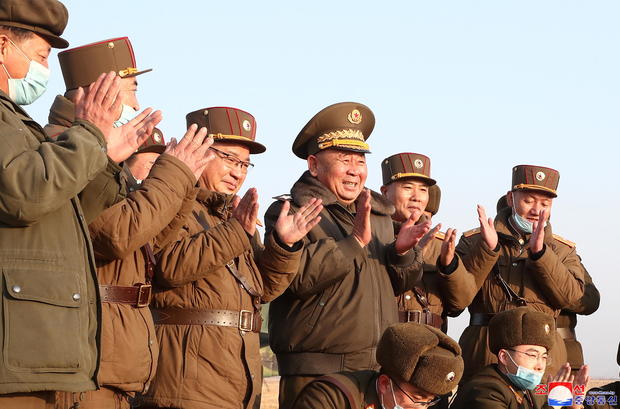Beijing — North Korea test-fired two short-range ballistic missiles on Thursday. It was Kim Jong Un’s first such launch since President Joe Biden took office, testing what Kim’s regime claimed were “new-type tactical guided projectiles” that hit their test targets off the country’s eastern coast.
The launches came just hours before Mr. Biden’s first scheduled solo news conference as commander-in-chief, during which the president confirmed the projectiles were ballistic missiles and thus a violation of United Nations sanctions barring North Korea from testing such weapons.
The missiles flew approximately 270 miles and landed in the East Sea. In its report on Friday claiming the missiles were a newly-developed variety, North Korea’s state-run KCNA news agency said Kim himself did not observe the launch, which he has done for some previous missile tests.
KCNA/Reuters
Mr. Biden said he considered North Korea is his top foreign policy challenge, and one on which he was consulting continuously with America’s allies and partners as the White House seeks to craft a new policy on dealing with the threat.
“There will be responses if they choose to escalate,” Mr. Biden said. “We will respond accordingly. But I’m also prepared for some form of diplomacy, but it has to be conditioned upon the end result of denuclearization.”
“It is a clear statement of intimidation,” retired South Korean Lieutenant General Chun In-bum told CBS News. He said North Korea wanted to show the world they “are not bound by any outside rules. The two short range ballistic missiles could easily have been intermediate or longer-range missiles if [North] Korea intended on doing so. This is going to go on and on until North Korea goes too far, and that’s what I am afraid of.”
North Korea has test-fired many missiles over the years, and the regime often tests new and sitting U.S. presidents in this manner to gain attention and to show anger. Thursday’s launch was the first test of a banned missile in a year, and it came just days after the Kim regime’s first test of any weapon at all system since Mr. Biden took office.
Mr. Biden played down the weekend test with a chuckle, but his remarks on Thursday showed the concern within his administration over North Korea’s calculated, escalating threats.
The U.S. military’s Indo-Pacific Command said in a statement earlier on Thursday that it was “aware of North Korean missile launches” and would continue monitoring the situation and “consulting closely with our allies and partners.”
“This activity highlights the threat that North Korea’s illicit weapons program poses to its neighbors and the international community,” the command said. “The U.S. commitment to the defense of the Republic of Korea [South Korea] and Japan remains ironclad.”
Just last week, U.S. Secretary of State Antony Blinken and U.S. Secretary of Defense Lloyd Austin visited the capitals of both Japan and South Korea and stressed that denuclearization of the Korean peninsula remained a top priority for the new administration.
The Biden White House is currently conducting a review of its North Korea policy, with an update expected in the coming weeks.
“It is a daunting challenge to the Biden administration,” said Won Gon Park, a professor of North Korean studies at South Korea’s Ewha Women’s University.
“Before finalizing its review on the North Korean policy, the Biden administration is forced to answer the North Korean provocation,” he told CBS News. “The Biden administration wants to emphasize the principles and norms of international order. Since North Korea’s ballistic missile is a definite violation of U.N. Resolution 1874, they need to summon the Security Council and condemn North Korea.”
KCNA/Reuters
North Korea has a long history of leveraging missile launches to try to win concessions from Washington at the negotiating table, often demanding financial aid and other assistance. The country is one of the poorest in the world and was reportedly grappling with famine and drought even before the coronavirus pandemic struck.
“In order to halt North Korea from advancing its nuclear and missile capabilities, it is important for South Korea and the U.S. to bring North Korea back to the negotiating table through the four-party talks involving China, South Korea, the U.S. and North Korea,” said Cheong Seong-Chang, Director of the Center for North Korean Studies in South Korea. “Making North Korea give up its nuclear weapons, which the North considers vital to its security, is as close to impossible as making Israel, India and Pakistan give up their own nuclear weapons.”
CBS News’ Jen Kwon in Seoul and Tucker Reals in London contributed to this report.
Source Article from https://www.cbsnews.com/news/north-korea-missile-launch-new-type-joe-biden-challenge-kim-jong-un/




Comments